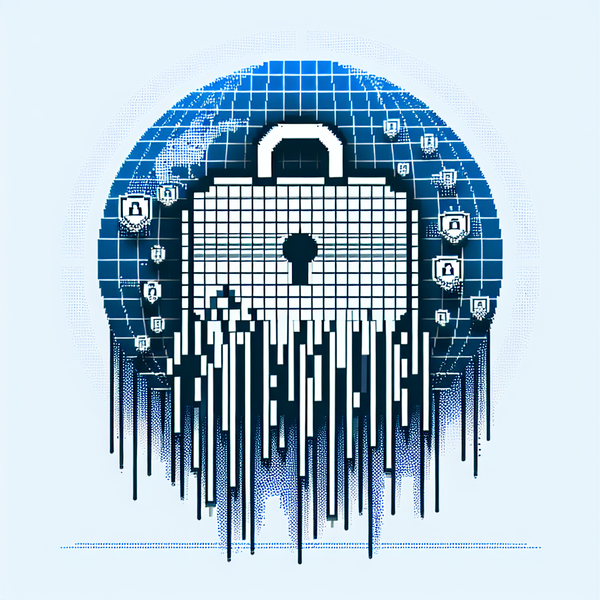Secret CISO 10/24: 23andMe DNA Breach, Verstappen Data Leak, AI Fraud Defense, North Korean Espionage, NVIDIA Vulnerability

Welcome to today's edition of Secret CISO, where we unravel the intricate web of cybersecurity challenges and innovations shaping our digital landscape. In this issue, we delve into a series of alarming data breaches that have rocked various sectors, from genetic data theft at 23andMe to high-profile sports figures like Max Verstappen falling victim to cyber intrusions. These incidents underscore the urgent need for enhanced security measures across industries.
We also explore the innovative strides being made in cybersecurity, such as the development of a machine learning model for real-time fraud detection and strategic partnerships aimed at fortifying defenses against phishing attacks. These advancements highlight the relentless pursuit of solutions to combat ever-evolving cyber threats.
Furthermore, we examine vulnerabilities in widely-used technologies, including a critical flaw in NVIDIA's vGPU software and security lapses in popular platforms like Magento and Moodle. These vulnerabilities serve as stark reminders of the importance of timely updates and robust security protocols.
Join us as we navigate these pressing issues and explore the cutting-edge solutions that promise to safeguard our digital future. Stay informed, stay secure.
Data Breaches
- 23andMe's Data-Theft Victims Offered 'Genetic Monitoring' to Ward Off Hackers: In a concerning development, 23andMe has offered genetic monitoring to victims of a data breach that exposed sensitive DNA information. This breach highlights the growing trend of genetic data becoming a target for cybercriminals, raising alarms about the security of personal genetic information. Source: WSJ
- FIA Confirms 'Hackers' Breached Verstappen's Personal Information: The FIA, Formula 1's governing body, confirmed a breach in its driver information database, affecting personal data of drivers like Max Verstappen. This incident underscores the vulnerabilities in high-profile sports organizations and the need for robust data security measures. Source: ESPN
- Toys R Us Canada Customer Data Swiped, Dumped Online: Toys R Us Canada has disclosed a data breach that resulted in customer information being leaked online. The breach, which includes names, addresses, and contact details, emphasizes the ongoing risks retailers face in protecting consumer data. Source: The Register
- Gatineau Gymnastics Club Warns Tens of Thousands of Customers After Online Security Breach: Unigym Gatineau alerted 21,000 customers about a data breach that compromised personal and financial information. The breach, discovered weeks after it occurred, highlights the importance of timely detection and notification in cybersecurity incidents. Source: CBC News
- Ga. Civil Engineering Co. Hit With Data Breach Class Action: A Georgia civil engineering firm faces a class action lawsuit following a data breach in 2024. The breach has led to criticism of the company's data protection practices, illustrating the legal and reputational risks associated with inadequate cybersecurity measures. Source: Law360
Security Research
- A Machine Learning-Based Novel Approach for Real-Time Detection of Digital Arrest Fraud: Researchers from Asia University have developed a machine learning model aimed at detecting digital arrest fraud in real-time. This innovative approach leverages AI to enhance cybersecurity measures, potentially reducing the incidence of fraud in digital transactions. Source: Computer.org
- How Hacked Card Shufflers Allegedly Enabled a Mob-Fueled Poker Scam That Rocked the NBA: Security researcher Joseph Tartaro uncovered how compromised card shufflers were used in a high-stakes poker scam linked to organized crime. This revelation highlights vulnerabilities in casino technology and the potential for significant financial and reputational damage. Source: Wired
- SEAL Partners with MetaMask, Others to Strengthen Global Phishing Defense Network: SEAL has collaborated with MetaMask and other entities to bolster defenses against phishing attacks. This partnership aims to disrupt phishing infrastructures, enhancing security for users worldwide. Source: SC World
- Over 250 Magento Stores Hit Overnight as Hackers Exploit New Adobe Commerce Flaw: A security researcher identified a new vulnerability in Adobe Commerce, leading to over 250 Magento stores being compromised. This incident underscores the critical need for timely security updates and vigilance in e-commerce platforms. Source: The Hacker News
- North Korean Hackers Lure Defense Engineers With Fake Jobs to Steal Drone Secrets: Security researchers revealed a North Korean campaign targeting defense engineers with fake job offers to extract sensitive drone technology information. This operation highlights the persistent threat of state-sponsored cyber espionage. Source: The Hacker News
Top CVEs
- NVIDIA vGPU Software Vulnerability: NVIDIA vGPU software contains a critical vulnerability in the Virtual GPU Manager, where a malicious guest could exploit uninitialized pointer access. This could lead to severe consequences such as code execution, denial of service, escalation of privileges, information disclosure, and data manipulation. Source.
- Productivity Suite Unrestricted IP Address Binding: A vulnerability in Productivity Suite software version v4.4.1.19 allows an unauthenticated remote attacker to interact with the ProductivityService PLC simulator. This could enable the attacker to read, write, or delete arbitrary files and folders on the target system. Source.
- OctoPrint-SpoolManager Authentication Flaw: The OctoPrint-SpoolManager plugin had a vulnerability in its APIs that did not enforce authentication or authorization checks. This issue, present in versions 1.8.0a2 and older of the testing branch and versions 1.7.7 and older of the stable branch, has been patched in newer versions. Source.
- Moodle Brute-Force Vulnerability: Moodle’s mobile and web service authentication endpoints were vulnerable to brute-force attacks due to insufficient restrictions on repeated password attempts. This posed a significant risk to user accounts. Source.
- OpenBao AWS Plugin Cross-Account Impersonation: The OpenBao AWS Plugin was vulnerable to cross-account IAM role impersonation, allowing unauthorized access by impersonating a role with the same name in a trusted account. This issue has been patched in version 0.1.1 of the auth-aws plugin. Source.
Final Words
As we wrap up today's edition of Secret CISO, it's clear that the digital landscape is as dynamic as it is daunting. From genetic data breaches at 23andMe to vulnerabilities in high-profile sports organizations like the FIA, the need for robust cybersecurity measures is more pressing than ever. The incidents at Toys R Us Canada and Unigym Gatineau further underscore the importance of protecting consumer data and ensuring timely breach notifications.
Innovative solutions like the machine learning model from Asia University and partnerships such as SEAL's collaboration with MetaMask offer hope in the fight against cyber threats. However, the continuous emergence of vulnerabilities, as seen with the Adobe Commerce flaw affecting Magento stores and the NVIDIA vGPU software issue, reminds us that vigilance is key.
In this ever-evolving cyber world, sharing knowledge is a powerful tool. If you found today's insights valuable, please share this newsletter with your friends and colleagues. Together, we can build a more informed and resilient community, ready to tackle the challenges of tomorrow.
Stay safe, stay informed, and see you in the next edition of Secret CISO!




